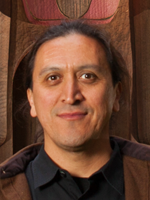Faculty, Staff & Students
E. Roberto Orellana, PhD

Professor, School of Social Work, University of Washington
Director, LUNA Program
Affiliated Faculty, Indigenous Wellness Research Institute
PhD Program Director, School of Social Work, University of Washington
E. Roberto Orellana joined the University of Washington School of Social Work as a professor in 2021. Before joining the School faculty, he was professor and associate dean for research and sponsored projects in the School of Social Work at Portland State University (PSU) where he also served as an affiliate faculty in Public Health and Indigenous Nations Studies. He has held visiting research scientist appointments at Columbia University’s Social Intervention Group, UCSD’s Department of Global Public Health, and collaborating faculty at Harvard University School of Public Health.
His global health experience includes research studies throughout the Americas:
PERU: An epidemiologic study of interpersonal violence in Lima; community-based studies of HIV/STIs and substance use among indigenous populations in the Peruvian Amazon; and a web-based intervention for high risk men who have sex with men (MSM) in Lima.
GUATEMALA: A qualitative study of the lived experiences of indigenous MSM and their increased vulnerability to HIV and substance abuse.
MEXICO/GUATEMALA: Currently, in collaboration with local and other U.S.–based investigators, Dr. Orellana is working on both sides of the Mexico/Guatemala border examining social and structural factors that increase vulnerability to drug use and HIV among MSM in a region of heavy drug and human trafficking.
UNITED STATES: Domestically, Dr. Orellana has worked on research studies with homeless individuals with mental illness (Seattle); Injection drug user (NYC); and individuals at high risk for HIV in the Pacific Northwest. Currently, he’s conducting a study with homeless youth in Portland, and he is the lead evaluator for Oregon State’s suicide prevention programs.
His training and research studies have been funded by USAID, SAMHSA NIMH, NIDA and NIMHD.




